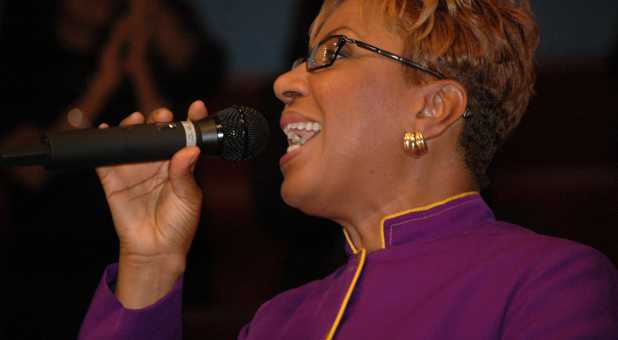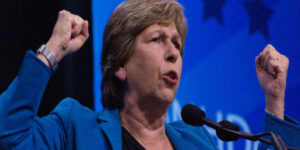Should Women Be Allowed to Preach in Church?
In the beginning, God created male and female. The characteristics of each are very unique for some basic functions. Men, usually more muscular, are more suited for heavy physical labor. Women were created with equal mental strength but with a physical makeup closely related to childbirth and childrearing. The beauty of that diversity is a wonderful balance in society. Men are more cognitive in their thinking. “Just the facts, Ma’am,” many men have said. Their ability to see the black and white, undistracted by feelings allows for a determined, undistracted effort to finish a task.
Women are said to think affectively, allowing their reasoning to be filtered through an emotional test, such as, “How will Sue feel if we do this.” God knew what He was doing. Just imagine if men raised the babies: “All right now! You are dry! You have your bottle! There is no logical reason for you to cry,” and then they would walk off. A mother would care for all the physical needs and then rock the baby to sleep. Most of us would be a mess if raised by our fathers. Perhaps that imbalance has been perpetrated onto the church because we have deprived our people of the special graces women bring into ministry.
Christianity found woman degraded and exalted her. In the surrounds of Bible days, women were chattel. If they were not slaves, they were servants of their husbands. Even in the Old Testament, the kings we revere had many wives. We can only believe that God allowed, but did not approve of that behavior. In Jewish custom, women were far more equal than other cultures of the day. But in Christ, there is neither male nor female and an expansion of that liberation places the role of women in a whole new light.
Until the women’s liberation movement, 66% of all women preachers were Pentecostal. Early Pentecostal churches were greatly augmented by the ministry of many great women preachers. Early Pentecostals believed the prophecy given by the prophet Joel, “Your sons and your daughters shall prophesy.”
Many preachers believe they are adhering to Paul’s supposed injunction against women preachers in I Corinthians 14. In its fuller context, Paul was discussing order in the early Pentecostal church. Many of the preachers who forbid women to speak turn right around and conduct some of the most disorganized worship services, betraying their own prejudices.
In an attempt to understand Paul, we find there are three views of Paul’s instruction to the Corinthian Church: The first view states that Paul had no right to state such a law or that he was not in the Spirit. We, who believe in the inerrancy of Scripture, would not accept off-the-cuff remarks as part of Scripture.
The second view believes the utterance was conclusive and final in an absolute sense and in all times and in all cultures. This injunction would have been contrary to the very nature of Judaism. Note the cases of Miriam, Deborah, Hannah, Huldah, Anna, the prediction of Joel and the four daughters of Philip. An absolute interpretation would be a denouncement of all ministry activity by women.
The final view feels that while there are unchanging matters of faith and morals, there are matters of manners and customs, which are local, national and timely. The text given was addressed to a Greek culture, not a Jewish culture. The Greeks disallowed an unveiled woman to be seen on the street.
A Greek could have observed a woman in a local assembly and have been shocked. He may have said, “So this is Christianity? How irreverent. It takes a mother from her home, so it is anti-family. It is similar to the cults! “Paul was probably saying that the Greeks should not discredit their own culture. Similarly, Paul did not denounce slavery in the issue of Onesimus in the book of Philemon. Was Paul wrong for not denouncing slavery? Was Paul wrong for not antagonizing the Greek culture? On Mars Hill, was Paul wrong for not only avoiding a denouncement of pagan gods, but also building upon a faith in pagan gods to introduce Christ? Christianity has had a very unique way of blending in with culture when its basic message is uncompromised.
Christianity made the woman a prophetess. No false interpretation of scripture can ever shut down her vocal chords. Neither faith, hope, love, learning, eloquence, nor the gospel itself has a sex. It was to women that the angelic news of Christ’s resurrection was pronounced and the responsibility of preaching its good news given. It was to women that God gave the charge of developing nearly every prophet and apostle in Scripture to godly manhood.
Organizations who do not allow women to preach contradict their own teaching by allowing female Sunday school teachers and women missionaries. Could it be that perspective is birthed with a touch of racism? An American man should not sit under a woman preacher, but men in the developing world can. From that we must deduce that men in the Third World are lesser creatures than men in the First World. Maybe when we really understand the practical ramifications of our teachings, it isn’t so pretty. We preach that the gospel is preached in song, but churches that disallow women preachers allow women singers.
If women cannot do some jobs in the church, is it not a balanced response that men cannot do other jobs in the church? How can we acknowledge God speaking through Balaam’s jackass when we do not acknowledge God speaking through a woman. Could our understanding be derived from an inflated view of ourselves? Does the preacher originate the message or is he simply the medium? If the preacher is simply the medium and the emphasis is on the Giver of the message, then is not any called and chosen vessel appropriate for God to use?
Do those who forbid women to preach deny God the ability to endow women with Spiritual gifts? How foolish that would be! Consequently, if God endows women with Spiritual gifts, then are we going to forbid God to use these women in pulpit ministry? What God has called clean, let us never call unclean. What God has called, let us never un-call! Pentecostals were forerunners of liberation because our elevation of women to the pulpit is not based on any societal rebellious bandwagon with no concern for God’s plan for the world. Rather, our advancement of women is rooted in the elevation all of us inherited through the cross. For when Christ was raised up on the crude cross, with Him He took the despair and discrimination of all people with Him. The rights of Christian women have not been won through any march up Pennsylvania Avenue, but by that infamous march down the Via Dolorosa.
Should women preach in your church? A prerequisite to that question should be, with whom does the problem lie. If you have a legitimate problem due to your view of scripture, that is your right. But if we are catering to our people’s sentiments, are we going to allow our people’s prejudices run our church or are we, as leaders, going to lead. As the pastors go, so go the churches. If your people do not accept women preachers, is it because your leadership has not persuaded them? After all, that’s what leadership is to do.
In a time when many men continue to wallow in self-pity and visionless missions, let the women arise from out of their quietness and shout from the housetops. We need a woman to stand in the gap as Deborah did as she cried out to her cowardly men, “Why abodest thou among the sheepfolds, to hear the bleating of the flocks (instead of going into battle)?” He who says it can’t be done should not get in the way of she who is doing it. When men still refuse to answer God’s call to the home church pulpit or the foreign fields, let the women arise and forever proclaim, “Here am I, use me!”
Dr. Clyde Hughes served as the Bishop/General Overseer of the International Pentecostal Church of Christ for 24 years. A veteran, Hughes holds an MA Degree from the Methodist Theological School in Ohio, and an honorary DD from Heritage Bible College. He was secretary of the Pentecostal/Charismatic Churches of North America and editor of The Pentecostal Leader for about 28 years.




























































